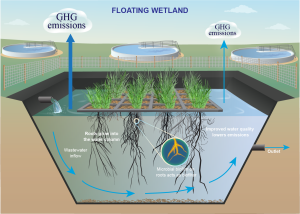Frequently Asked Questions – Floating Wetlands Pilot Project
Why are we doing this project?
Managing treated effluent and emissions produced from wastewater treatment plants is a common challenge for the water industry. This study aims to show how a nature-based solution can be used, with benefits not just for the water sector but the broader community as we adapt and respond to climate change.
The researchers’ findings will be shared with the broader water sector and the local community throughout the project, with workshops and a community open day planned.
The findings of the pilot study will also inform the design and implementation of a permanent, large-scale restorative wetland system at King Road Wastewater Treatment Plant, due to commence in 2025.
What are Floating Wetlands?
Constructed Floating Wetlands, (Floating Wetlands) are a recent innovation for wastewater treatment. They mimic the appearance of a natural floating island. Like a hydroponic system, the roots of native plants grow into the water under modules that float on the surface of the water.
As the plants grow, their roots provide habitat for microorganisms that assist with the removal of wastewater pollutants and capture floating particles in the water.
Image credit: Lukas Schuster, Deakin University
What are the potential benefits of a floating wetland?
Water Quality Improvements
- Adding an additional, all-natural filtration step into the wastewater treatment process will improve the quality of water discharged into the ocean, keeping the natural environment healthier and reducing the risk of nutrient pollution.
Less greenhouse gas emissions
- Floating wetlands minimise greenhouse gas emissions by capturing and storing carbon that would otherwise be emitted into the atmosphere as greenhouse gases.
Other benefits include increased biodiversity, improved bioremediation opportunities, enhanced water security and cost savings.
The project will also inform the design and implementation of a recycled water wetlands storage system at King Road Wastewater Treatment Plant, due to commence in 2025.
When will the results of the pilot project be available?
Conclusive results will be released after the project finishes in mid-2025.


